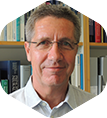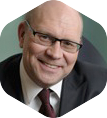Speakers
Our first conference featured a high calibre of international speakers

Prof. Patrick Aebischer
Prof. Patrick Aebischer

Prof. Patrick Aebischer was trained as an MD (1980) and a neuroscientist (1983) at the University of Geneva and Fribourg in Switzerland. From 1984 to 1992, he worked at Brown University, USA as an Assistant Professor and then Associate Professor of Medical Sciences. In 1991, he became the Chairman of the Section of Artificial Organs, Biomaterials and Cellular Technology of the Division of Biology and Medicine of Brown University. In the fall of 1992, he returned to Switzerland as a Professor and Director of the Surgical Research Division and Gene Therapy Center at the Centre Hospitalier Universitaire Vaudois (CHUV) in Lausanne. In 1999, Prof. Aebischer was nominated as President of EPFL by the Swiss Federal Council. He took office as President on March, 2000 and since January 2004, he is a member of the ETH Board.
His current research focuses on the development of cell and gene transfer approaches for the treatment of neurodegenerative diseases. Prof. Aebischer is a member of numerous professional societies, both in Europe and the USA. He is a fellow of the American Institute for Medical and Biological Engineering and a fellow of the Swiss Academy of Medicine. Prof. Aebischer is also a founder of two biotechnology companies: CytoTherapeutics (today Stem Cell Inc) and Modex Therapeutics (today IsoTis).

Prof. Alim-Louis Benabid
Prof. Alim-Louis Benabid

Prof. Alim-Louis Benabid received his medical degree in 1970 and a doctorate in physics in 1978, both from Joseph Fourier University in Grenoble, France. He became a staff neurosurgeon at Joseph Fourier University, France in 1972, professor of experimental medicine in 1978, and professor of biophysics from 1983 – 2007. Prof. Benabid also had a fellowship in 1979 – 1980 in preclinical neuropharmacology in the laboratory of Floyd Bloom at the Salk Institute for Biological Studies, USA. From 1988 to 2007, he directed the preclinical neurosciences unit at the French biomedical and public health research institution INSERM, and from 1989 to 2007, served as head of the neurosurgery department at the University Hospital of Grenoble, France. In other roles, Prof. Benabid coordinated the Claudio Munari Center for Surgery of Epilepsy and Movement Disorders at Hospital Niguarda in Milan, Italy from 1998 to 2007, and was a staff consultant at the Cleveland Clinic Foundation in Ohio, USA from 2000 to 2003. In 2007, Prof. Benabid joined the French Commissariat d’ Energie Atomique (CEA - France's nuclear and renewable energy commission) as a scientific adviser during the time a campus for public-private innovation was being created, the Grenoble Innovation for Advanced New Technologies (Giant) campus, which includes the Minatec research complex and the life-science cluster NanoBio. In 2009, he became Chairman of the Board of the Edmond J. Safra Biomedical Research Center at Clinatec, a translational biomedical technology organisation he helped found within Minatec. Clinatec was jointly created by CEA-Leti (Laboratoire d'électronique des technologies de l'information—an applied micro- and nanotechnology subsidiary of CEA), Grenoble University Hospital, INSERM and Joseph Fourier University. In 2013, when awarding Prof. Benabid a $100,000 Robert A. Pritzker Prize for Leadership in Parkinson's Research to fund continued research, the Michael J. Fox Foundation said in its award announcement that Benabid had published 523 scientific papers, achieving an H Index of 67, as well as given 18 honorary lectures, and received 23 medals and prizes.

Prof. Olaf Blanke
Prof. Olaf Blanke

Prof. Olaf Blanke is the founding Director of the Center for Neuroprosthetics, Bertarelli Foundation Chair in Cognitive Neuroprosthetics at EPFL, Switzerland. He also directs the Laboratory of Cognitive Neuroscience at EPFL and is Professor of Neurology at the Department of Neurology, University Hospital of Geneva, Switzerland. Prof. Blanke's research is dedicated to the neuroscientific study of multisensory body perception and its relevance for self-consciousness by using a broad range of methods such as invasive and non-invasive electrophysiology, brain imaging in healthy subjects, and neurological and psychiatric patients. Most recently he has pioneered the joint use of engineering techniques such as robotics and virtual reality with techniques from cognitive neuroscience and their application to systems and cognitive neuroprosthetics and neuro-rehabilitation.

Prof. Stephen Bloom
Prof. Stephen Bloom

Prof. Sir Steve Bloom heads a 40 strong research team investigating the physiology of regulatory peptides in the CNS and periphery. Prof. Bloom received his undergraduate medical training from Cambridge University, UK. His house officer, senior house officer and registrar posts were largely undertaken at Middlesex Hospital, UK where he also received his MRC Clinical Research Fellow training. He moved to the Royal Postgraduate Medical School at Hammersmith Hospital, UK in 1974 where his roles have included Senior Lecturer (Consultant Physician), Reader in Medicine, Chairman of the Higher Degrees Committee and Academic Board, Professor of Medicine (Honorary Consultant Physician), Director of the Endocrinology Clinical Service and Deputy Director, Department of Medicine, Director of Chemical Pathology (renamed Metabolic Medicine and later Investigative Medicine), Chief of Clinical Service Chemical Pathology and Chief of Service Endocrinology and Diabetes.

Prof. Saeed Bohlega
Prof. Saeed Bohlega

Prof. Saeed Bohlega, President of the Saudi Neurological Society, obtained his basic medical training at King Saud University, Saudia Arabia and graduated in 1980. In 1982, he went to Canada where he trainied in Neurology at University of British Columbia, Vancouver BC. He trained with Professor Don Paty. He developed a specialist interest in multiple sclerosis and he did subspecialty training in neurophysiology. In 1989, Prof. Bohlega joined the Department of Neurosciences at King Faisal Specialist Hospital and Research Centre as a Consultant Neurologist. He worked as a Consultant and then as a Senior Consultant and was appointed as Professor of Neurology at Al Faisal University, Saudia Arabia.
Prof. Bohlega is a member of many prestigious neurological societies like the American Neurological Association and the British Royal College of Physicians and Surgeons. He worked as a Section Head of Neurology then as a Chairman of the Department of Neurosciences. He is a Founder and Chairperson of the National Saudi Board of Neurology for ten years as well as the Chairman of the Saudi Multiple Sclerosis Advisory Group.He is also the President of the Saudi Neurology Society and the President Elect for the Pan Arab Union of Neurological Societies (PANUS). Prof. Bohlega has received numbers of national and international awards for his clinical and academic contributions. He has published more than 122 papers in a peer-reviewed journals, written book chapters, and has presented more than 180 presentations in various conferences.

Dr. Jamil El-Imad
Dr. Jamil El-Imad

Dr. Jamil El-Imad is an Honorary Senior Research Fellow at the Institute of Biomedical Engineering at Imperial College London, a Fellow at the Institution of Engineering and Technology London, as well as the Managing Director and Chief Scientist of NeuroPro - a Swiss-based medical technology research, design and commercialisation company focused on bringing innovative, safe and low-cost solutions for applied neural signal analysis to the research and healthcare community.

Prof. Ralph Etienne-Cummings
Prof. Ralph Etienne-Cummings

Prof. Ralph Etienne-Cummings received his BSc in Physics from Lincoln University, Pennsylvania, USA in 1988. He completed his MSEE and PhD in Electrical Engineering at the University of Pennsylvania in 1991 and 1994, respectively. Currently, Prof. Etienne-Cummings is a Professor of Electrical and Computer Engineering, and Computer Science at Johns Hopkins University, USA. He was the Founding Director of the Institute of Neuromorphic Engineering. He has served as Chairman of various IEEE Circuits and Systems (CAS) Technical Committees and was elected as a Member of the CAS Board of Governors. He also serves on numerous editorial boards and was recently appointed Deputy Editor in Chief for the IEEE Transactions on Biomedical Circuits and Systems. He is the recipient of the NSF’s Career and Office of Naval Research Young Investigator Program Awards. He was a Visiting African Fellow at the University of Cape Town, Fulbright Fellowship Grantee, Eminent Visiting Scholar at the University of Western Sydney and has also won numerous publication awards, including the 2012 Most Outstanding Paper of the IEEE Transaction on Neural Systems and Rehabilitation Engineering. He was also recently recognised as a “Science Maker”, an African American history archive. He has published over 200 peer-reviewed articles and holds numerous patents on his work.

Prof. Thomas Grunwald
Prof. Thomas Grunwald

Prof. Thomas Grunwald was born in 1956 in Germany and now lives in Zürich, Switzerland. He is a Neurologist, specialising in epileptology and clinical neurophysiology and especially in pre-surgical evaluations for epilepsy surgery at the Swiss Epilepsy Centre in Zürich. In addition, he is Senior Consultant for epileptology at the Department of Neurology, University Hospital Zürich and teaches neurology at Bonn University Medical Centre, Germany. His main area of research is cognitive neurophysiology of memory processes, and he cooperates in the study of neurophysiological correlates of artistic and rhetorical communication with the Zürich University of the Arts, Switzerland, and the University of Arts and Design in Karlsruhe, Germany.

Prof. Yike Guo
Prof. Yike Guo

Prof. Yike Guo, is a Professor in Computing Science in the Department of Computing, Imperial College London, and the Head of the Discovery Science Group (DSG) of the department. His research focus is on large-scale scientific data analysis and big data analysis infrastructure. During the last 15 years, he has been leading the DSG of the department to carry out many successful research projects, including: Discovery Net on Grid-based data analysis environment for scientific discovery (UK e-Science pilot project); MESSAGE on real time data analysis on mobile sensor network; BAIR on System biology for diabetes study; i-Healthcare on information driven healthcare; UBIOPRED on large informatics platform for translational medicine research and Digital City Exchange on sensor information-based urban dynamics modeling. He has been focusing on applying data analysis and data mining technologies to scientific data analysis in the fields of life science and healthcare, environment science and security. He is now the Principal Investigator of the EU eTRIKS IMI project, a 22 million Euro investment in building the World’s first open science platform on big data for personalised medicine. He is also the Chief Innovation Officer of the IDBS, the UK’s major scientific data management company; the Chief Technical Officer of the tranSMART foundation organising the world wide effort in building an open source informatics platform for translational medicine research. In addition, he is now also leading the establishment of Institute of Data Science at Imperial College London.

Prof. Sean Hill
Prof. Sean Hill

Prof. Sean Hill is Co-Director of the Blue Brain Project and Co-Director of Neuroinformatics in the European Union funded Human Brain Project at EPFL. Prof. Hill also serves as the Scientific Director of the International Neuroinformatics Coordinating Facility at the Karolinska Institutet in Stockholm, Sweden. Prof. Hill has extensive experience in building and simulating large-scale models of brain circuitry and has also supervised and led research efforts exploring the principles underlying the structure and dynamics of neocortical and thalamocortical microcircuitry. He currently serves in management and advisory roles on several large-scale clinical informatics initiatives around the world. After completing his PhD in Computational Neuroscience at the Université de Lausanne, Switzerland, Prof. Hill held postdoctoral positions at The Neurosciences Institute in La Jolla, California, USA and the University of Wisconsin, Madison, USA then joined the IBM TJ Watson Research Center where he served as the Project Manager for Computational Neuroscience in the Blue Brain Project until his appointment at the EPFL.

Dr. Wolfgang Knecht
Dr. Wolfgang Knecht

Dr. Wolfgang Knecht received a Master in Physics from the Massachusetts Institute of Technology and a PhD in Technical Science from ETH Zurich concentrating on artificial neural networks for applications in acoustics. He also received an executive business education from the University of Zurich. After several years in private industry R&D working on noise reduction systems for digital hearing instruments he is currently the managing director of the Neuroscience Center Zurich (ZNZ) of the University and ETH Zurich.
At the ZNZ he is responsible for the implementation of research strategies, such as for the Swiss National Center of Competence in Research (NCCR) in “Neural Plasticity and Repair” where he served as a deputy director in the management team.

Dr. Christof Koch
Dr. Christof Koch

Dr. Christof Koch has dedicated his life to researching neuroscience, having spent 25 years at the California Institute of Technology, USA as a Professor in Biology and Engineering. In 2011, Dr. Koch left academia to join the Allen Institute for Brain Science, a not-for-profit organisation dedicated to creating resources to fuel discovery among researchers worldwide and to advance the scientific community's understanding of the brain in health and disease. He is leading a 10-year, large-scale, high throughput effort to build brain observatories to map, analyse, and understand the cerebral cortex. Dr. Koch has authored more than 300 scientific papers and articles, eight patents, and five books concerned with the way neurons process information and the neuronal and computational basis of visual perception, selective attention, and consciousness. Together with his long-time collaborator, Francis Crick, Dr. Koch pioneered the scientific study of consciousness. His latest book is Consciousness -Confessions of a Romantic Reductionist.

Prof. Hilal Lashuel
Prof. Hilal Lashuel

Prof. A Lashuel received his BSc degree in Chemistry from the City University of New York, USA in 1994 and completed his doctoral studies at Texas A&M University and the Scripps Research Institute in 2000. After obtaining his doctoral degree, he became a Research Fellow at the Picower Institute for Medical Research in Long Island New York. In 2001, he moved to Harvard Medical School and the Brigham and Women's Hospital as a Research Fellow in the Center for Neurologic Diseases and was later promoted to an Instructor in Neurology at Harvard Medical School. During his tenure (2001-2004) at Harvard Medical School his work focused on understanding the mechanisms of protein misfolding and aggregation and the role of these processes in the pathogenesis of Parkinson's and Alzheimer's disease. In 2005 Prof. Lashuel moved to Switzerland to join the Brain Mind Institute at EPFL as a tenure-track Assistant Professor in Neurosciences. Currently, Prof. Lashuel is an Associate Professor of Life Sciences and the Director of the Laboratory of Molecular and Chemical Biology of neurodegeneration. He is also the Secretary General of the Society for Advancing Science and Technology in the Arab World. In 2009, he was named by the Hebdo magazine (Forum des 100) as one of the most outstanding personalities in the French region of Switzerland and was recently named Young Global Leader by the World Economic Forum.

Prof. Pierre Magistretti
Prof. Pierre Magistretti

Prof. Pierre J. Magistretti received his MD from the University of Geneva and his PhD in Biology from UCSD. He is currently the Dean of the Division of Biological and Environmental Sciences and Engineering at King Abdullah University of Science and Technology, Saudi Arabia. He also has an affiliation as Professor of Neuroscience at the Brain Mind Institute, EPFL, Switzerland. Prof Magistretti's laboratory has discovered some of the cellular and molecular mechanisms that underlie the coupling between neuronal activity and energy consumption of the brain. These findings are particularly relevant for understanding the origin of the signals detected by functional brain imaging, and are revealing a role of astrocytes in neuronal plasticity. Prof Magistretti is the author of over 240 publications in international peer-reviewed journals. He has been elected as the International Chair 2007-2008 of the Collège de France, Paris. He is a member of Academia Europaea and of the Swiss Academy of Medical Sciences. He is the past-President of the Federation of European Neuroscience Societies and the past-Secretary General of the Organization, of which he has been President since 2014. He is strongly engaged in the public understanding of neuroscience.

Prof. Miguel A.L. Nicolelis
Prof. Miguel A.L. Nicolelis

Prof. Miguel A.L. Nicolelis, M.D., Ph.D., is the Duke School of Medicine Distinguished Professor of Neuroscience at Duke University, Professor of Neurobiology, Biomedical Engineering and Psychology and Neuroscience, and founder of Duke's Center for Neuroengineering. He is Founder and Scientific Director of the Edmond and Lily Safra International Institute for Neuroscience of Natal. Prof. Nicolelis is also founder of the Walk Again Project, an international consortium of scientists and engineers, dedicated to the development of an exoskeleton device to assist severely paralyzed patients in regaining full body mobility.
Prof. Nicolelis has dedicated his career to investigating how the brains of freely behaving animals encode sensory and motor information. As a result of his studies, Prof. Nicolelis was first to propose and demonstrate that animals and human subjects can utilize their electrical brain activity to directly control neuroprosthetic devices via brain-machine interfaces (BMI).
Over the past 25 years, Prof. Nicolelis pioneered and perfected the development of a new neurophysiological method, known today as chronic, multi-site, multi-electrode recordings. Using this approach in a variety of animal species, as well in intra-operative procedures in human patients, Prof. Nicolelis launched a new field of investigation, which aims at measuring the concurrent activity and interactions of large populations of single neurons throughout the brain. Through his work, Prof. Nicolelis has discovered a series of key physiological principles that govern the operation of mammalian brain circuits.
Prof. Nicolelis pioneering BMI studies have become extremely influential since they offer new potential therapies for patients suffering from severe levels of paralysis, Parkinson's disease, and epilepsy. Today, numerous neuroscience laboratories in the US, Europe, Asia, and Latin America have incorporated Prof. Nicolelis' experimental paradigm to study a variety of mammalian neuronal systems. His research has influenced basic and applied research in computer science, robotics, and biomedical engineering.
Prof. Nicolelis is a member of the French and Brazilian Academies of Science and has authored over 200 manuscripts, edited numerous books and special journal publications, and holds three US patents. His award-winning research has been published in Nature, Science, and Scientific American and has been widely reported in national and international media. He is the author of Beyond Boundaries: The New Neuroscience of Connecting Brains with Machines and How It Will Change Our Lives; and most recently co-authored The Relativistic Brain: How it Works and Why it Cannot be Simulated by a Turing Machine.

Dr. Stefan Wess
Dr. Stefan Wess

Dr. Stefan Wess holds his PhD in Artificial Intelligence/Computer Science and is a highly recognised technology industry veteran with multinational front-line technology and scientific leadership experience. Dr. Wess has written and published numerous books and articles on Artificial Intelligence and Case-Based Reasoning. He has been in charge of organising several international scientific conferences. For several years Dr. Wess was member of the scientific advisory board of the German Research Center for Artificial Intelligence (DFKI) and belongs now to the Board of Directors. He is also a Trustee of the German Fraunhofer Gesellschaft.
His professional career includes roles as the technical manager of the US CRM software company Inference (acquired by eGain Inc.), member of the executive board at tecmath AG (acquired by Avid), CEO for tec:inno, CTO and CEO of a Bertelsmann arvato AG subsidiary in Guetersloh, Germany, CEO of arvato Middle East in Dubai, and later member of the Attensity Group management board, Palo Alto, out of which Empolis Information Management GmbH was spun off as an independent company in 2012.
Keep in touch
Subscribe for the latest announcements and events from The Brain Forum.




